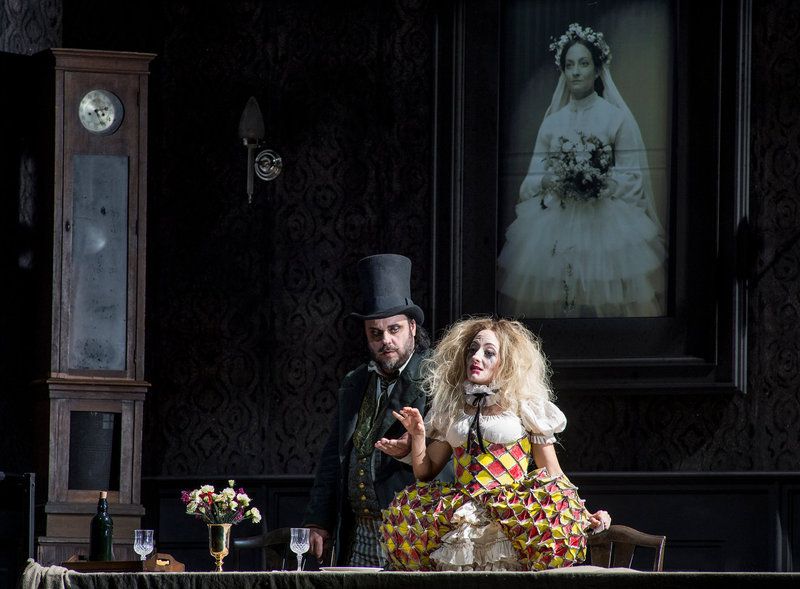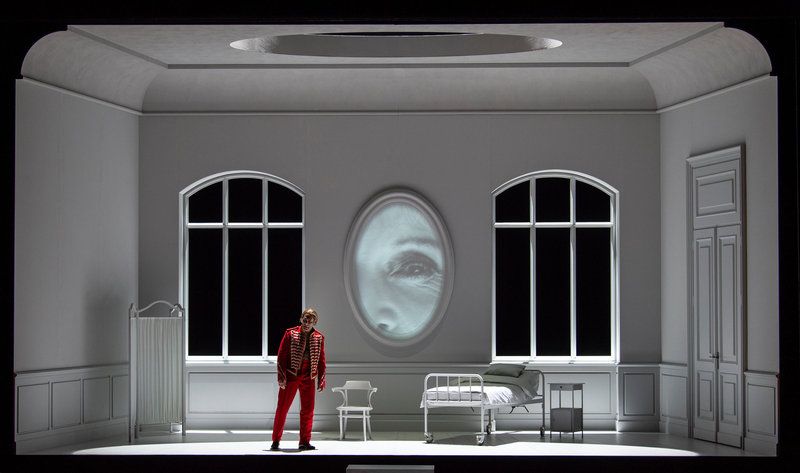

At Salzburg Festival, Two Bold Directors Claim Their Stages
By Anthony Tommasini
Aug. 12, 2018
SALZBURG, Austria — The American director Lydia Steier was 9 years old when “The Princess Bride” was released. She pays homage to that popular 1987 Rob Reiner film in her charming, and mysterious, production of Mozart’s “The Magic Flute” here at the Salzburg Festival.
In the film a grandfather reads a bedtime story to his video-gaming grandson, who at first resists the tale of romance and adventure but becomes completely engrossed. Ms. Steier borrows that framing device for her staging of Mozart’s fairy-tale opera, presented at the main festival hall.
Here a grandfather, whom we first see at dinner with his prosperous family in a house that suggests Vienna just before World War I, reads “The Magic Flute,” a story he seems to know well, to his three grandsons. The grandfather’s engaging narrative, written by Ms. Steier and the dramaturge Ina Karr, is refashioned from the opera’s spoken dialogue, usually the most awkward element of any production. And the actor Klaus Maria Brandauer, no less, makes a touching grandfather.
In the multilevel set we see circus posters plastered to the walls of the boys’ bedroom and shelves crammed with toy soldiers. As the grandfather reads the story, the boys imagine it taking place in their home with people from their lives transformed into the characters. Three sullen servants become the Three Ladies who serve the Queen of the Night. The boys’ petulant mother becomes that forbidding Queen (the brilliant soprano Albina Shagimuratova). A jocular household employee becomes Papageno (the hearty bass-baritone Adam Plachetka).
The family’s lovely grown daughter appears in the tale as an emotionally troubled Pamina (the melting soprano Christiane Karg). One of boys’ toy soldiers turns into the questing Prince Tamino (the youthful, ardent tenor Mauro Peter), who bursts into their room through a window fleeing shafts of flame from the jaws of the story’s ferocious monster. Naturally, the youngsters (played by charming members of the Vienna Boys Choir) become Mozart’s Three Boys, the spirits who appear at crucial moments in the opera to guide characters on their romantic and spiritual journeys.
Ms. Steier’s production goes deeper, and darker, than just adventure yarns. Sarastro, the high priest in a temple of enlightenment, here becomes a powerful magician who runs a fantastical circus with bizarrely costumed dancers, tumblers, acrobats on stilts with puppet heads, some 30 extras in all, as well as a large chorus. Circus metaphors have been turning up often in opera productions of late. But Ms. Steier’s use of this potentially clichéd imagery feels well motivated, since the boys live it every day, and powerful, hinting at the global forces before World War I when the old order was disintegrating.
Sarastro (the acclaimed baritone Matthias Goerne singing a bass role that seemed ill-suited to his voice) and his troupe are like dropouts from society who can’t fathom what’s going on. They are not blameless, this production suggests. When the ragtag inhabitants of this realm sing Mozart’s choruses affirming brotherhood, for a moment they seem to have insights into the human dilemma. You want them to do something.
The conductor Constantinos Carydis brought a strong take to Mozart’s familiar score, sometimes choosing quite fast tempos, other times stretching out the music’s sublime passages. But the musicians of the great Vienna Philharmonic responded to his every demand with warm and effortless playing.
Ms. Steier sometimes clutters this staging with an excess of carnival antics. Still, the production offers a deeply personal reading of a staple without crossing a line and imposing an interpretation upon it.
That more ideological approach has been the province, his many critics have said over the years, of the avant-garde director Hans Neuenfels, now 77. I’ve certainly seen some agenda-driven Neuenfels productions, including his Salzburg debut in 2000, a staging of “Così Fan Tutte” riddled with kinky sexual play and leather. The experience led the soprano Karita Mattila to complain in a later interview of feeling like “a beaten dog” after every performance. But Mr. Neuenfels’s new staging of Tchaikovsky’s “Pique Dame,” also presented at the main festival hall, despite some baffling touches, shows a compelling director in his element.
In a conversation with Yvonne Gebauer, the production’s dramaturge, printed in the program, Mr. Neuenfels makes some penetrating comments about why the main character, Herman, an officer of no means, spends his time in gambling houses without actually gambling. Herman is frustrated by the randomness of existence, Mr. Neuenfels says, whereby people born to privilege enjoy the freedom and power only money can provide. Herman becomes obsessed with the randomness of gambling, where perhaps he could prevail if only he could game the system. That chance comes when he hears of the aged Countess (the opera’s Queen of Spades), who is thought to possess a winning formula: the secret of the three cards.
Herman is almost saved by falling in love with Liza, a young noblewoman engaged to the handsome, honorable Prince Yeletsky. Love involves a real choice between two people; there is nothing random about it. But Herman’s obsession wins out, which drives the disgraced Liza to suicide and Herman to the gambling table, where, having wrested the secret from the Countess, or so he deludes himself, he wins big, then loses everything, and shoots himself.
Employing stark, somewhat abstract sets and costumes that blend realistic and surreal touches, the production plumbs the teeming yet murky emotions of the opera. Mr. Neuenfels draws gripping performances from a strong cast. The tenor Brandon Jovanovich brings heroic vocal heft and tormented intensity to Herman. The mix of earthy colorings and vulnerability in the singing of soprano Evgenia Muraveva are ideal for Liza. She is a gambler too, in that she rejects a safe life with an adoring prince to take a chance on passion with the desperate Herman, which turns out to be a bad bet. The baritone Igor Golovatenko makes a noble, rich-voiced Yeletsky. The renowned mezzo-soprano Hanna Schwarz, at 74, still claims the stage and sings with dramatic urgency as the faded Countess.
As usual, Mr. Neuenfels’s interpretive slants come through the most in the way he lumps groups of people together during episodes with chorus. In the opening scene some young boys are rolled out in cages, like pets, until they emerge wearing matching silvery uniforms and wigs: They are being groomed to become soldiers, the staging touch emphasizes. The rowdy children are tended to by chortling nannies in fluffy dresses who have bulging breasts, ready for nursing, hanging from their necks. If obvious, the images are certainly theatrical.
The Vienna Philharmonic sounded glorious under the dynamic conducting of Mariss Jansons. And the impressive choristers proved ready to follow an imposing director wherever he wanted to take them dramatically.
https://www.nytimes.com/2018/08/12/arts ... ctionfront